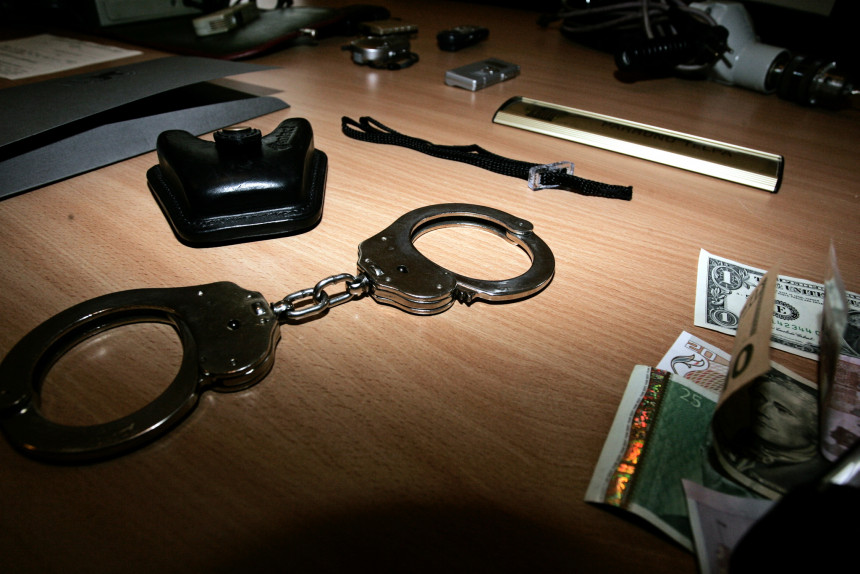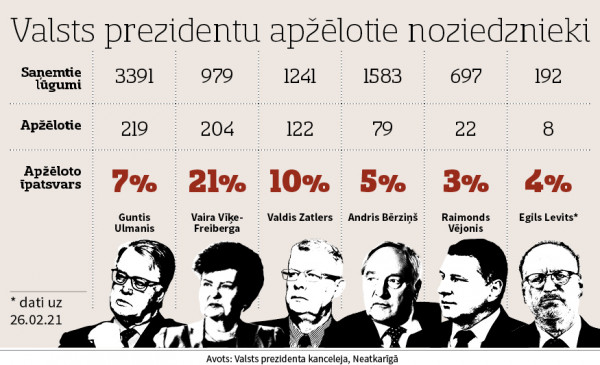Are Latvian presidents becoming more and more coldhearted?

Former President Vaira Vīķe-Freiberga once pardoned every fifth convict who asked for pardon. So far, President Egils Levits has shown mercy to only 4% of the criminals who appealed to him for pardon. Are the presidents of our country becoming more and more coldhearted, or are the crimes becoming more serious?
A few weeks ago, President Egils Levits considered ten pardon requests from convicts, and none of them was granted. Justīne Deičmane, Head of the Media Center of the Chancery of the President, informed that the President has so far reviewed the pardon requests of 192 convicts and pardoned eight.
During his term, Raimonds Vējonis pardoned 22 people, Andris Bērziņš - 79 people, Valdis Zatlers - 122 people, Vaira Vīķe-Freiberga - 204 people, Guntis Ulmanis - 219 people. However, each of the presidents has considered a different number of pardon requests, for example, Guntis Ulmanis considered 3391 pardon requests during his presidency, of which about 7 percent was granted, while Raimonds Vējonis considered 697 such agreements, of which he pardoned about 3 percent. During her presidency, Vaira Vīķe-Freiberga reviewed 979 pardon agreements, pardoning every fifth.
Raimonds Vējonis saw more good than evil in Neo's crime
In 2017, Raimonds Vējonis pardoned Ilmārs Poikāns, who was sentenced to 60 hours of community service for obtaining information containing trade secrets from the Electronic Revenue System of the State Revenue Service. The accusations were based on the events of 2009 when Ilmārs Poikāns used a security hole in the State Revenue Service database to access data on the salaries of civil servants. He passed the information to the Latvian Television program De Facto, which presented it to the general public.
"Although Ilmārs Poikāns has broken the law by his actions, the public benefit from Ilmārs Poikāns' actions has been significantly greater than the consequences of his crime. This has promoted openness and transparency in public administration, as well as highlighted the importance of security for state information systems,” R. Vējonis emphasized at that time. President completely released Ilmārs Poikāns from serving the basic sentence and removed his conviction. When deciding on the pardon, R. Vējonis had also taken into account the fact that Ilmārs Poikāns came to the State Probation Service to apply for the execution of a sentence after the court judgment came into force.

""Thank you" for the overzealous work of all investigators, prosecutors and judges who have become blind from their obedience, but it turned out to be in vain. Now is the last chance to rethink future decisions 7 times before making them, to decide whether you obey the orders blindly and see only the letter of the law, not the spirit, to finally start thinking with your head and remember your conscience. It's time for everyone to evaluate their actions every day!” said Poikāns in a statement to the media.
Levits shows more lenience than his predecessor
At the end of 2019, President Egils Levits granted the pardon request of the participant of the January 13 riots, the convicted Ansis Ataols Bērziņš, and removed his sentence.
Ansis Ataols Bērziņš had already twice asked for pardon from previous President Raimonds Vējonis, but these requests were rejected. E. Levits granted the request of A. A. Bērziņš, in which it was stated that A. A. Bērziņš's criminal record prevents him from fully engaging in pedagogical and scientific work. At that time, A. A. Bērziņš was no longer in prison. He was released from prison as early as 2018 for serving a year and eight months' imprisonment, including his imprisonment in a Czech prison.
Neatkarīgā has already written that Ansis Ataols Bērziņš was initially sentenced to one year and eight months' suspended prison sentence for participating in the riots at Old Riga on January 13, 2009. The court also applied the supervision of the State Probation Service (SPS) to A. A. Bērziņš, however, he did not comply with it and did not appear at the SPS, as a result of which the court changed its decision and replaced the suspended prison sentence with real imprisonment. At that moment, Bērziņš decided to leave Latvia, in his own words, going into "political exile". In such circumstances, A. A. Bērziņš was announced as internationally wanted at the beginning of 2016, until the spring of 2017 when he was detained in the Czech Republic, which extradited him to Latvia.
Pardoning murderers as well
In March 2014, former President Andris Bērziņš pardoned two people who had been sentenced for murder. However, the names of the pardoned were not disclosed. It is known only that one of the pardoned persons was 82 years old at the time and had been convicted of murder in 2009. The second person pardoned for murder was 30 years old at the time. He was sentenced by the Riga Regional Court in 2006 to 12 years in prison, confiscation of property and police control for three years for aggravated murder. The convict was released from serving the basic sentence, serving a term of nine years and two months.
Ulmanis rescued five convicts from the death penalty
In his September 1995 announcement, former President Guntis Ulmanis established a Pardon Council of ten people with advisory rights, which was invited to participate in the examination of pardon requests of people sentenced to death. He examined the pardon requests of eight people sentenced to death and pardoned five convicts, replacing the death penalty with life imprisonment, according to information on the website of the Chancery of the President. In Latvia, the last death penalties were carried out in January 1996 on two convicts whose pardons were rejected by the President. In total, from 1990 to 1996, 13 people were executed on behalf of the State of Latvia.
On April 16, 1999, the Saeima passed the law “On Protocol No. 6 to the European Convention for the Protection of Human Rights and Fundamental Freedoms of November 4, 1950”. Article 2 of the Protocol provides that a State may make provision in its law for the death penalty in respect of acts committed in time of war or of imminent threat of war; such penalty shall be applied only in the instances laid down in the law and in accordance with its provisions. On October 13, 2011, the Saeima passed the law “On Protocol No. 13 to the European Convention for the Protection of Human Rights and Fundamental Freedoms of November 4, 1950, on the Complete Abolition of the Death Penalty”. On December 1, 2011, the Saeima passed the Amendments to the Criminal Law, removing the death penalty from the law. The law entered into force on January 1, 2012. According to the previous wording of Article 37 of the Criminal Law, the death penalty could be imposed only for murder in particularly aggravating circumstances and only if the crime was committed during the war.
Who can request a pardon?
An application for a pardon may be made after the court judgment enters into force, except in cases where a person has been sentenced to imprisonment for a serious or particularly serious crime. In cases where a person has been convicted of a serious crime, an application for a pardon may be made if at least half of the imprisonment sentence has been served. On the other hand, if a person has been convicted of a particularly serious crime, an application for a pardon may be submitted if at least two-thirds of the imprisonment sentence has been served. If a life sentence has been imposed, the person must have served at least 20 years of the imprisonment sentence before submitting the application.
If the request is rejected, it may be resubmitted not sooner than six months after the request for pardon has been rejected. In cases where a person has been convicted of a serious or particularly serious crime, a repeated request for a pardon may be submitted no earlier than one year after the rejection of the request, unless special circumstances have arisen (serious illness, being the sole legal guardian, or other circumstances).
In total, since 1992, presidents have considered 8,083 pardon requests, of which 654 have been granted. So, every twelfth is pardoned.
*****
Be the first to read interesting news from Latvia and the world by joining our Telegram and Signal channels.
